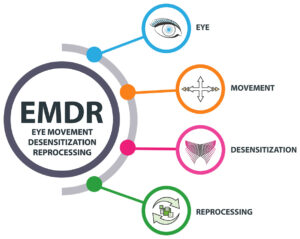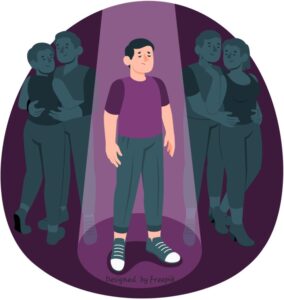Dialectical behavioral therapy (DBT) is a form of Cognitive behavioral therapy (CBT). Cognitive-behavioral therapy makes an effort to identify and change negative thinking and behavioral patterns and pushes for positive changes in the patients’ thoughts and behaviors. Dialectical behavior therapy is evidence-based psychotherapy.
It initially began as an effort to treat borderline personality disorder. But on further development, there is evidence that DBT can be useful in treating mood disorders, suicidal ideation, and for change in behavioral patterns such as self-harm, and substance abuse. It teaches the patients to cope with changes and unhealthy behaviors that can hamper their life.
History of DBT:
The term “dialectical” comes from the philosophical idea of bringing together two opposites – acceptance and change in therapy for better results than either one alone. DBT was developed in the late 20th century by Dr. Marsha Linehan when they figured out that Cognitive behavioral therapy didn’t work so well alone. Dr. Linehan and her colleagues developed a form of therapy that catered to the unique needs of the patients.
A unique aspect of DBT is that it focuses on the acceptance of a patient’s traumatic experience or their problem as a way for therapists to reassure them and work towards improvement and change negative behaviors. Dialectics works on three basic assumptions, which are:
- All things are interconnected to each other in one way or another.
- Change is the only constant and it’s inevitable.
- Opposites can be integrated to form a closer approximation of the truth.
How does DBT work?
A Standard comprehensive DBT comprises of four parts:
- Individual therapy: It is conducted with a trained professional where those learned behavioral skills are adapted to the person’s personal life challenges.
- Group skills training: It is in group settings that an individual is taught behavioral skills by doing homework assignments and role-playing new ways of interacting with people.
- Phone or online coaching: It is a method useful for crises in between sessions. In phone coaching a person can call their therapist in between sessions to receive guidance on coping with a difficult at-the-moment situation.
- A consultation group is developed for health care providers to stay motivated and discuss the patient’s care and progress.
Patients in DBT are made to do homework to practice new skills as part of therapy. This includes filling out daily “diary cards or journals” to track more than 40 emotions, urges, behaviors, and skills, such as lying, self-injury, or self-respect.
Therapeutic Approaches:
While each therapeutic setting has its own set structure, goals, and benefits, the following characteristics of a standard comprehensive DBT:
Support: Patients are encouraged to recognize their positive strengths and attributes and develop and use them.
Behavioral: You’ll learn to analyze any problem or destructive behavior patterns and replace them with healthy and effective ones through the therapy.
Cognitive: The main focus is on changing thoughts or beliefs and behavior or actions that are not effective or helpful.
Skill sets: Patient is made to learn new skills to enhance their capabilities to cope.
Acceptance and change: You’ll learn strategies to accept and tolerate your life, emotions, and yourself as well as hone skills to help you make positive changes in your behaviors and interactions with others so that your daily life isn’t riddled with problems.
Collaboration: You learn to communicate effectively and work together as a team in order to treat the problem at hand.
DBT Strategies:
People undergoing DBT are taught how to effectively change their behavior and thought processes in order to lead a better life using four main strategies:
-
- Core Mindfulness: Mindfulness skills are perhaps the most important strategy in DBT. It teaches you to focus on the present or “live in the moment.” By inculcating this you learn to pay attention to what’s going on inside of you (thoughts, feelings, sensations, impulses) as well as what’s outside of you (what you see, hear, smell, and touch) in an impartial way. These skills will help you to slow down so you can focus on healthy coping skills and help you deal with emotional pain. Mindfulness helps you to stay calm and avoid engaging in negative thought patterns or impulsive and damaging behavior.
-
- Distress Tolerance: Distress tolerance is teaching to accept yourself and the current situation you are in. More specifically, it helps you learn how to tolerate or survive crises using four techniques: distraction, self-soothing, improving the moment, and thinking of the pros and cons of not tolerating distress. By learning distress tolerance techniques, the patient is able to prepare in advance for any intense emotional spiral and cope with them with a more positive long-term outlook.
-
- Interpersonal Effectiveness: Interpersonal effectiveness is a method to help you become more assertive in a relationship (for example, expressing your needs and saying “no”) while still keeping that relationship positive and healthy. This is done by learning to listen and communicate effectively. Individual is also made to learn to respect themselves and as well as others.
-
- Emotion Regulation: Emotion regulation provides a set of skills that helps one to effectively navigate powerful feelings either positive or negative. It teaches you to identify, name, and then eventually change your emotions. By recognizing and learning to cope with intense negative emotions (for example, anger), you can reduce your emotional vulnerability and have more emotionally positive experiences.
Online DBT Therapy:
Online therapy is a form of therapy that is delivered remotely, across the internet, rather than in person. It is a fairly new option credited to the immense growth in technology. Research shows online therapy can be very effective and is as good as normal therapy. It is often a good fit for many people. Online DBT therapy service specifically caters to meet the needs of people in for those who have difficulty with travel, restricted hours, shift work, time restrictions, or who can’t find DBT therapy nearby.
Online DBT is no different from normal DBT and it follows all the same standards and strategies. The only difference is that the patient can receive treatment from the comfort of his or her own house at his or her convenience. One can always seek help from a professional very easily by just searching on the internet “Dialectical behavioral therapy near me” or “DBT therapy online” and they can easily choose a suitable option for themselves.
Feel free to reach out to us for counseling and psychotherapy sessions from our trained psychologists, and psychotherapists.




